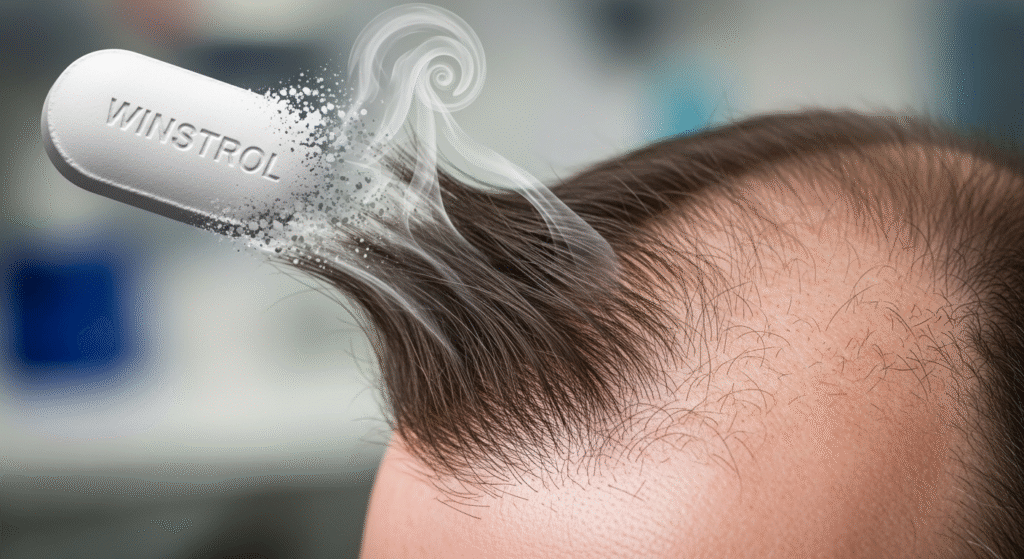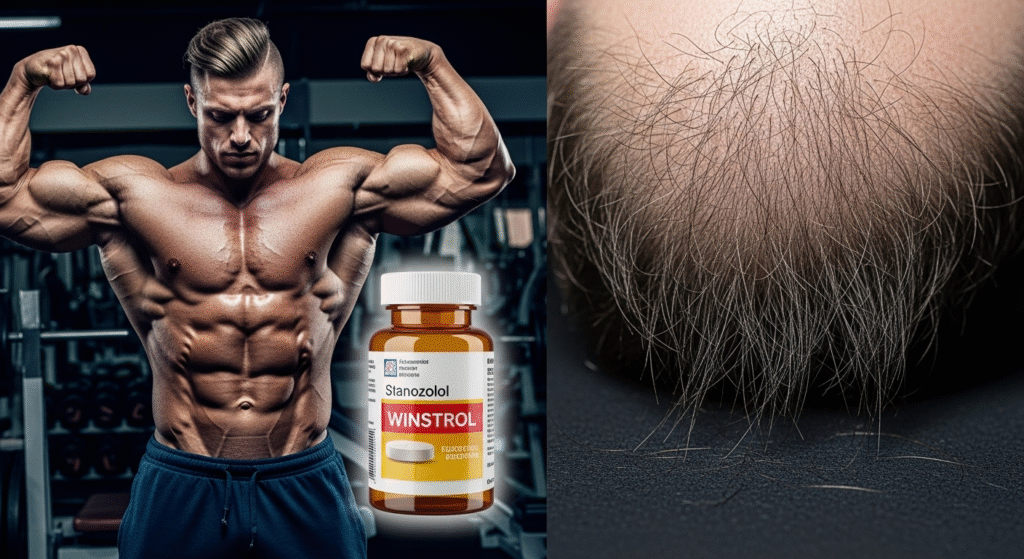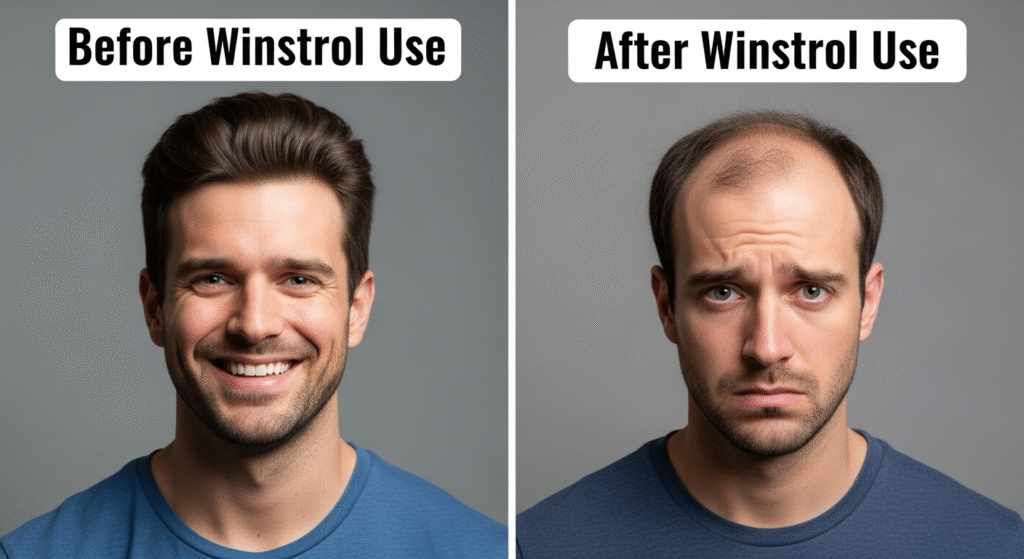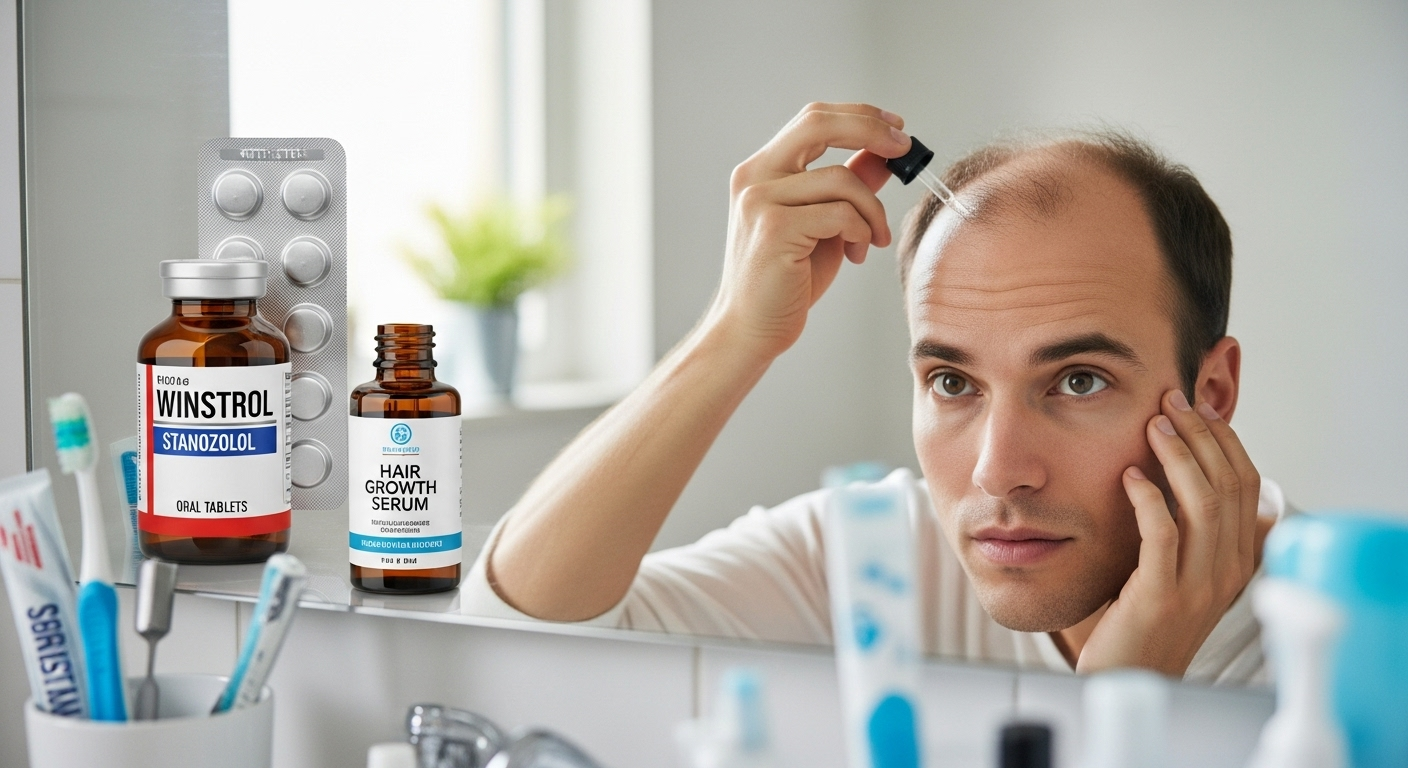If you're considering using Winstrol (stanozolol) or have already started using it, you might be concerned about the potential side effect of hair loss. Winstrol, a popular anabolic steroid, is known for its ability to enhance athletic performance, but it also raises concerns regarding hair thinning, especially in individuals who are genetically predisposed to male …
If you’re considering using Winstrol (stanozolol) or have already started using it, you might be concerned about the potential side effect of hair loss. Winstrol, a popular anabolic steroid, is known for its ability to enhance athletic performance, but it also raises concerns regarding hair thinning, especially in individuals who are genetically predisposed to male pattern baldness.
This article will explore how Winstrol contributes to hair loss, identify those most at risk, and provide practical solutions to help you manage or prevent this issue. By the end, you’ll be equipped with the knowledge to make informed decisions about your steroid use and hair health.

What Is Winstrol and How Does Winstrol Cause Hair Loss?
Overview of Winstrol (Stanozolol)
Winstrol, also known by its generic name stanozolol, is an anabolic steroid that is widely used by athletes and bodybuilders for its ability to increase muscle mass and improve strength.
Originally developed to treat medical conditions like osteoporosis and hereditary angioedema, Winstrol has gained popularity for its ability to enhance athletic performance. It’s available in both oral and injectable forms, and its use has extended to improving physical appearance and performance in sports.
Mechanism of Action: Anabolic vs. Androgenic Effects
Winstrol primarily works through its anabolic (muscle-building) effects, which help increase protein synthesis and muscle retention. However, like many anabolic steroids, it also has androgenic (male hormone-like) effects, which can contribute to side effects like hair loss.
The balance between anabolic and androgenic activity determines how pronounced these side effects will be, including the impact on hair follicles.
Common Uses in Sports and Medicine
Winstrol is commonly used in competitive sports, particularly in weight-class sports like boxing, wrestling, and bodybuilding. Its use in these sports is often aimed at improving strength, speed, and muscle definition without excessive water retention.
However, despite its benefits in performance enhancement, it’s banned by most sports organizations due to its potential for abuse and side effects.
The Link Between Winstrol and Hair Loss

Understanding DHT and Its Role in Hair Follicle Miniaturization
Hair loss caused by steroids like Winstrol is often linked to dihydrotestosterone (DHT), a potent androgenic hormone derived from testosterone. DHT binds to androgen receptors in hair follicles, causing them to shrink and produce thinner, shorter hairs. Over time, this process, known as miniaturization, leads to hair thinning and eventual baldness.
How Winstrol Increases DHT Levels
Winstrol increases the levels of DHT in the body by promoting the conversion of testosterone into this more potent hormone. This increase in DHT can accelerate hair loss, particularly in individuals who are genetically predisposed to male pattern baldness.
The androgenic effects of Winstrol make it more likely to cause hair thinning, especially for those who are already prone to hair loss due to their genetic makeup.
Genetic Predisposition and Accelerated Hair Thinning
Individuals with a family history of male or female pattern baldness are at a higher risk of experiencing hair loss when using Winstrol or other anabolic steroids. In these individuals, the presence of DHT can exacerbate the genetic process of hair follicle miniaturization, leading to more noticeable hair thinning.
Reported Cases and Clinical Observations
While clinical studies on Winstrol’s direct effects on hair loss are limited, there are numerous anecdotal reports from users who have experienced accelerated hair thinning after using the steroid. These reports are consistent with the known effects of DHT on hair follicles, and they highlight the importance of considering potential side effects before starting steroid use.
Who Is Most at Risk?

Individuals with a Family History of Male Pattern Baldness
The risk of hair loss due to Winstrol is significantly higher in individuals with a family history of male or female pattern baldness. This genetic predisposition makes the hair follicles more sensitive to DHT, making hair thinning more likely, even with short-term use of Winstrol.
Younger Users Without Visible Thinning
Younger users who do not yet show signs of hair thinning may be surprised by the onset of hair loss after starting Winstrol. Because DHT affects hair follicles over time, even those with no visible thinning may start to notice changes after several weeks of use.
Long-Term or High-Dose Users
Long-term use of Winstrol or high doses of the steroid can increase the likelihood of experiencing hair loss. The prolonged exposure to high levels of DHT can lead to significant hair follicle damage, especially if combined with other androgenic steroids.
Users Combining Winstrol with Other Androgenic Steroids
Combining Winstrol with other steroids that also increase DHT levels, such as testosterone or dianabol, can compound the risk of hair loss. The cumulative effect of these steroids can exacerbate the androgenic side effects, including hair thinning and baldness.
Preventing or Managing Hair Loss While Using Winstrol
Medications to Block DHT (e.g., Finasteride, Dutasteride)
To prevent or manage hair loss caused by Winstrol, medications that block DHT, such as finasteride or dutasteride, can be effective. These drugs work by inhibiting the enzyme responsible for converting testosterone into DHT, thereby reducing the impact on hair follicles.
Topical Treatments: Minoxidil and Ketoconazole Shampoo
Topical treatments like minoxidil, a vasodilator that promotes hair growth, and ketoconazole shampoo, which can help reduce DHT levels on the scalp, are commonly used to manage hair loss. These treatments can help counteract the thinning caused by Winstrol and may promote hair regrowth when used consistently.
Lifestyle Adjustments: Diet, Stress Management, and Scalp Care
A healthy diet rich in vitamins and minerals, particularly those that support hair health (like biotin, zinc, and vitamins A and E), can help mitigate hair thinning. Additionally, managing stress levels and taking proper care of your scalp (e.g., gentle washing, avoiding harsh chemicals) can support healthy hair growth.
Alternative Steroids with Lower Hair Loss Risk
If you’re concerned about hair loss but still want the benefits of steroids, consider alternatives to Winstrol that have a lower risk of affecting hair health. Some steroids, like nandrolone, have less pronounced androgenic effects and may be less likely to cause hair thinning.
When to Seek Professional Help
Signs of Permanent Hair Follicle Damage
If you notice that hair loss persists even after discontinuing Winstrol, it may indicate permanent follicle damage. If the thinning becomes noticeable or severe, it’s important to consult with a healthcare professional or dermatologist to explore potential treatments and solutions.
Consulting a Dermatologist or Hair Restoration Specialist
A dermatologist or hair restoration specialist can help you understand the extent of hair loss caused by Winstrol and offer personalized advice on managing the condition. They can also recommend medical treatments or procedures, such as hair transplants, if necessary.
Exploring Hair Restoration Options: PRP, FUE, and FUT
For those experiencing significant hair loss, procedures like Platelet-Rich Plasma (PRP) therapy, Follicular Unit Extraction (FUE), or Follicular Unit Transplantation (FUT) may offer viable solutions to restore hair growth. These treatments are commonly used to counteract hair thinning and promote healthy regrowth.
Expert Insights and Real-World Experiences
Users’ Experiences with Winstrol and Hair Thinning
Many users have shared their experiences of noticing hair thinning after using Winstrol, particularly when combined with other steroids. Some have successfully managed the issue with DHT blockers and lifestyle changes, while others have opted for hair restoration treatments after permanent follicle damage occurred.
Success Stories: Managing or Reversing Hair Loss
There are also numerous success stories of individuals who have successfully managed steroid-induced hair loss by combining medical treatments like finasteride with topical solutions and lifestyle changes. Early intervention plays a critical role in preventing further hair loss and promoting regrowth.
FAQs
Can Winstrol cause permanent hair loss?
While Winstrol can cause hair thinning, especially in those predisposed to male pattern baldness, the effects are not always permanent. Discontinuing the steroid and using DHT blockers can help prevent permanent damage.
How quickly can hair loss occur after starting Winstrol?
Hair loss from Winstrol use can begin within weeks to months, depending on factors like dosage, duration of use, and genetic predisposition.
Are there any steroid alternatives that don’t affect hair?
Some anabolic steroids, such as nandrolone, have a lower risk of affecting hair health compared to Winstrol, but all steroids carry some level of risk.
What are the most effective treatments for steroid-induced hair loss?
The most effective treatments for steroid-induced hair loss include DHT blockers like finasteride, topical minoxidil, and lifestyle changes to support overall hair health.
Conclusion
While Winstrol can contribute to hair loss, especially in genetically predisposed individuals, understanding the risks and taking proactive steps can help prevent or manage this side effect. By using DHT blockers, adopting proper hair care routines, and seeking professional guidance when necessary, you can minimize the impact on your hair health while still achieving your fitness goals.
Consult a Specialist
If you’re considering Winstrol or are already experiencing hair thinning, consult a healthcare provider or hair restoration specialist. Early intervention can make a significant difference in preserving your hair health. Book a consultation with Dr. Uzma Irfan, an ISHRS-certified surgeon in Islamabad today.






